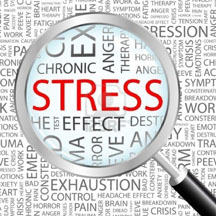So, stress is up! We all know that high stress levels are on the rise all across the nation but what’s the real truth about stress today? Why is it impacting everyone we know- both the young and the old, and why does its negativity reign supreme?
 According to the key findings of the American Psychological Association (APA), there are 2 terrible truths about stress today (1). To help you better understand these truths and in return your own personal stress, here’s more.
According to the key findings of the American Psychological Association (APA), there are 2 terrible truths about stress today (1). To help you better understand these truths and in return your own personal stress, here’s more.
1. Self-care is not a priority. Only forty percent of Americans rate their health as very good or excellent, leaving the remaining sixty percent with less than adequate self-rated health, as stated by the APA. (2) The first terrible truth about stress in America is a lack of self-care. It’s simply not a priority. Instead of managing stress in healthy ways by staying active, eating nutritional meals, and making our personal health a priority we opt to indulge in unhealthy behaviors like drugs and alcohol, over or under eating, and being lazy when it comes to regular exercise.
The APA continues to provide a list of startling facts including, “two-fifths of Americans reported overeating or eating unhealthy foods due to stress.” (3) The terribly sad truth is that we, as Americans are taking part in a viciously repetitive cycle. We choose to eat unhealthy, not be active, and overall not make self-care a priority which in return creates stress in our life. And what do we do because we are feeling stressed? We continue to eat unhealthy, not be active, and not make self-care a priority. Yikes!
2. Lack of willpower is the problem. The second truth in our one-two-punch against stress is the lack of willpower. The APA cites the lack of willpower as being the biggest barrier to adopting healthier behavior and continues to inform us that survey respondents are mistakenly relying on an inner strength to make necessary health changes (4). Similar to standing in front of an empty refrigerator with the door wide open waiting for something delicious to appear, you too should stop waiting for some inner strength to emerge against unhealthy choices.
Willpower is a choice you make, not something that all of a sudden happens within you. Combatting the stress in your life requires better health choices through nutrition and exercise and both of those choices take a strong will power. Don’t be afraid to awaken yours.
Stress is up because self-care and willpower are down. The 2 terrible truths, the first being that Americans are not prioritizing self-care through eating healthy and being active and the second, that Americans have a lack of willpower are society’s downfall when it comes to combatting stress. Want to beat the stress in your personal life? It’s as simple as prioritizing your health and having the willpower to stick to those healthy choices.
Mark D. Parisi, Psy.D. & Associates, P.C. provides counseling, psychological testing, and psychotropic medication management in Mount Prospect and Chicago – serving surrounding Cook, Lake, DuPage, and Will Counties. They accept most insurance and offer extremely affordable sliding scale rates. Call (847) 909-9858 for a free, no-obligation telephone consultation.
###
Sources:
- Stressed In America, 2 Terrible truths, 2011, http://www.apa.org/monitor/2011/01/stressed-america.aspx
- Stressed In America, Americans rate personal health stats, 2011, http://www.apa.org/monitor/2011/01/stressed-america.aspx
- Stressed In America, Unhealthy eating due to stress stats, 2011, http://www.apa.org/monitor/2011/01/stressed-america.aspx
- Stressed In America, Lack of willpower facts, 2011, http://www.apa.org/monitor/2011/01/stressed-america.aspx


 Most people experience stress on a daily basis. For some it is mild and easily controlled, but for others it can be serious and begin to affect their everyday lives. There are many ways to manage stress, but exercise is one that can assist in stress management as well as provide many other health and mental benefits.
Most people experience stress on a daily basis. For some it is mild and easily controlled, but for others it can be serious and begin to affect their everyday lives. There are many ways to manage stress, but exercise is one that can assist in stress management as well as provide many other health and mental benefits. 2. Encourage Stability. Having a consistent routine as well as a goal to be attained can shift the focus of a person’s mind. Even if the stress factors in his life have not been removed, the stability offered by a proper exercise regimen can allow him to concentrate on something other than those stress factors. If you are in need of some consistency in your everyday schedule, make exercise part of your daily routine, not just something that you do if you have time. The best way to accomplish this is to join a specific class that meets at a specified time or to work out with a friend; if someone is relying on you to be there, you are less likely to make excuses.
2. Encourage Stability. Having a consistent routine as well as a goal to be attained can shift the focus of a person’s mind. Even if the stress factors in his life have not been removed, the stability offered by a proper exercise regimen can allow him to concentrate on something other than those stress factors. If you are in need of some consistency in your everyday schedule, make exercise part of your daily routine, not just something that you do if you have time. The best way to accomplish this is to join a specific class that meets at a specified time or to work out with a friend; if someone is relying on you to be there, you are less likely to make excuses. While many of us are familiar with ways to both control and cope with depression symptoms, you may be surprised to learn that research findings show we may also be able to help prevent them. According to the American Psychological Association (APA) psychologists Jane Gillham, Lisa Jaycox, Karen Reivich, and Martin Seligman all set out to prove just that (1).
While many of us are familiar with ways to both control and cope with depression symptoms, you may be surprised to learn that research findings show we may also be able to help prevent them. According to the American Psychological Association (APA) psychologists Jane Gillham, Lisa Jaycox, Karen Reivich, and Martin Seligman all set out to prove just that (1).
